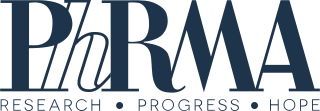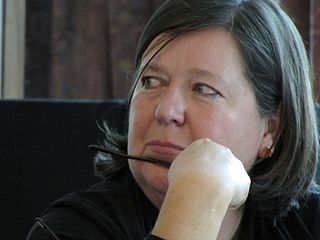
A patent is a type of intellectual property that gives its owner the legal right to exclude others from making, using, or selling an invention for a limited period of time in exchange for publishing an enabling disclosure of the invention. In most countries, patent rights fall under private law and the patent holder must sue someone infringing the patent in order to enforce their rights.
The Doha Declaration on the TRIPS Agreement and Public Health was adopted by the WTO Ministerial Conference of 2001 in Doha on November 14, 2001. It reaffirmed flexibility of TRIPS member states in circumventing patent rights for better access to essential medicines.

Pharmaceutical Research and Manufacturers of America, formerly known as the Pharmaceutical Manufacturers Association, is an American trade group representing companies in the pharmaceutical industry. Founded in 1958, PhRMA lobbies on behalf of pharmaceutical companies. PhRMA is headquartered in Washington, D.C.

The pharmaceutical industry is a medical industry that discovers, develops, produces, and markets pharmaceutical goods such as medications and medical devices. Medications are then administered to patients for curing or prevention of disease, as well as alleviating symptoms of illness or injury.
An advance market commitment (AMC) is a promise to buy or subsidise a product if it is successfully developed. AMCs are typically offered by governments or private foundations to encourage the development of vaccines or treatments. In exchange, pharmaceutical companies commit to providing doses at a fixed price. This funding mechanism is used when the cost of research and development is too high to be worthwhile for the private sector without a guarantee of a certain quantity of purchases.
A compulsory license provides that the owner of a patent or copyright licenses the use of their rights against payment either set by law or determined through some form of adjudication or arbitration. In essence, under a compulsory license, an individual or company seeking to use another's intellectual property can do so without seeking the rights holder's consent, and pays the rights holder a set fee for the license. This is an exception to the general rule under intellectual property laws that the intellectual property owner enjoys exclusive rights that it may license—or decline to license—to others.
The pharmaceutical industry in India was valued at an estimated US$42 billion in 2021 and is estimated to reach $130 billion by 2030. India is the world's largest provider of generic medicines by volume, with a 20% share of total global pharmaceutical exports. It is also the largest vaccine supplier in the world by volume, accounting for more than 60% of all vaccines manufactured in the world. Indian pharmaceutical products are exported to various regulated markets including the US, UK, European Union and Canada.

The pharmaceutical lobby refers to the representatives of pharmaceutical drug and biomedicine companies who engage in lobbying in favour of pharmaceutical companies and their products.

Ellen F. M. 't Hoen is an international medical activist. She is an expert in medicines policy and intellectual property law and has been a consultant to a number of countries and international organisations. In 2005 and 2006 she was listed as one of the 50 most influential people in intellectual property in the world by the journal Managing Intellectual Property.

The Agreement on Trade-Related Aspects of Intellectual Property Rights (TRIPS) is an international legal agreement between all the member nations of the World Trade Organization (WTO). It establishes minimum standards for the regulation by national governments of different forms of intellectual property (IP) as applied to nationals of other WTO member nations. TRIPS was negotiated at the end of the Uruguay Round of the General Agreement on Tariffs and Trade (GATT) between 1989 and 1990 and is administered by the WTO.
A biological patent is a patent on an invention in the field of biology that by law allows the patent holder to exclude others from making, using, selling, or importing the protected invention for a limited period of time. The scope and reach of biological patents vary among jurisdictions, and may include biological technology and products, genetically modified organisms and genetic material. The applicability of patents to substances and processes wholly or partially natural in origin is a subject of debate.

Tedros Adhanom Ghebreyesus is an Ethiopian public health official, researcher, diplomat, and the Director-General of the World Health Organization since 2017. He is the first African to become WHO Director-General, receiving an endorsement for the role by the African Union. Tedros played a role in the response to the Ebola virus epidemic, the COVID-19 pandemic, and the 2022–2023 mpox outbreak.

The Coalition for Epidemic Preparedness Innovations (CEPI) is a foundation that takes donations from public, private, philanthropic, and civil society organisations, to finance independent research projects to develop vaccines against emerging infectious diseases (EID).
Access to medicines refers to the reasonable ability for people to get needed medicines required to achieve health. Such access is deemed to be part of the right to health as supported by international law since 1946.

Vaccine development and production is economically complex and prone to market failure. Development is unprofitable in rich and poor countries, and is done with public funding. Production is concentrated in the hands of a small number of powerful companies which acquire key legal monopolies and make very large profits.

As of 12 August 2024, 13.53 billion COVID-19 vaccine doses have been administered worldwide, with 70.6 percent of the global population having received at least one dose. While 4.19 million vaccines were then being administered daily, only 22.3 percent of people in low-income countries had received at least a first vaccine by September 2022, according to official reports from national health agencies, which are collated by Our World in Data.

Proprietary drug are chemicals used for medicinal purposes which are formulated or manufactured under a name protected from competition through trademark or patent. The invented drug is usually still considered proprietary even if the patent expired. When a patent expires, generic drugs may be developed and released legally. Some international and national governmental organizations have set up laws to enforce intellectual property to protect proprietary drugs, but some also highlight the importance of public health disregarding legal regulations. Proprietary drugs affect the world in various aspects including medicine, public health and economy.
Vaccine equity means ensuring that everyone in the world has equal access to vaccines. The importance of vaccine equity has been emphasized by researchers and public health experts during the COVID-19 pandemic but is relevant to other illnesses and vaccines as well. Historically, world-wide immunization campaigns have led to the eradication of smallpox and significantly reduced polio, measles, tuberculosis, diphtheria, whooping cough, and tetanus.

Priti Krishtel is a lawyer and advocate for patent reform and increased public participation in the patent system. She co-founded the United States-based nonprofit organization the Initiative for Medicines, Access, and Knowledge.

The Initiative for Medicines, Access, and Knowledge, known as I-MAK, is a U.S.-based global 501(c)(3) organization that advocates in the public interest for affordable access to medicines, and a medicines system that is more inclusive of patients and the public.












